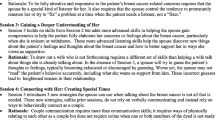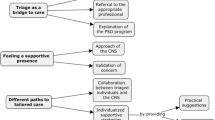Abstract
Purpose
To compare costs and relative cost savings from reductions in unscheduled health services use for two 8-week psychosocial interventions (telephone interpersonal counseling [TIPC], supportive health education [SHE]) delivered by telephone to Latinas with breast cancer and their informal caregivers. Cost information is required before adopting supportive care interventions as part of routine care. There is limited information on costs of producing supportive care interventions or their impact on service use.
Methods
Latinas and their caregivers were randomized to either TIPC or SHE. At baseline and month 4, hospitalizations and urgent care and emergency department (ED) visits in the previous month were recorded. These were compared by trial arm for 181 survivors and 169 caregivers using logistic regression, adjusting for age and health services use at baseline.
Results
Total cost per 100 survivors was $28,695 for SHE and $27,399 for TIPC. Urgent care and ED visits were reduced for survivors in SHE versus TIPC (odds ratio (OR) = 0.31, 95% confidence interval (CI) [0.12, 0.88], p = .03). For hospitalizations, OR for SHE versus TIPC was 0.59, 95% CI [0.26, 1.37], p = .07. There were no differences between trial arms for caregiver health services use. Cost savings for SHE versus TIPC from reductions in health services use per 100 survivors ranged from $800 for urgent care to $17,000 for ED visits and $13,000 for hospitalizations.
Conclusions
Based on this evidence, SHE can be a cost-saving supportive care solution that benefits not only survivors and caregivers, but also oncology practices reimbursed through episodes of care.
Similar content being viewed by others
Data availability
De-identified data would be shared after IRB approvals were obtained with the consent of the collaborators.
References
Mustian KM, Alfano CM, Heckler C, Kleckner AS, Kleckner IR, Leach CR, Mohr D, Palesh OG, Peppone LJ, Piper BF, Scarpato J, Smith T, Sprod LK, Miller SM (2017) Comparison of pharmaceutical, psychological, and exercise treatments for cancer-related fatigue: a meta-analysis. JAMA Oncol 3(7):961–968
Suh SR, Lee MK (2017) Effects of nurse-led telephone-based supportive interventions for patients with cancer: a meta-analysis. Oncol Nurs Forum 44(4):E168–E184
Kim SH, Kim K, Mayer DK (2017) Self-management intervention for adult cancer survivors after treatment: a systematic review and meta-analysis. Oncol Nurs Forum 44(6):719–728
Howell D, Harth T, Brown J, Bennett C, Boyko S (2017) Self-management education interventions for patients with cancer: a systematic review. Support Care Cancer 25:1323–1355
Fridriksdottir N, Gunnarsdottir S, Zoega S, Indadottir B, EJG H (2018) Effects of web-based interventions on cancer patients’ symptoms: review of randomized trials. Support Care Cancer 26(2):337–351
McNulty J, Kim W, Thurston T, Kim J, Larkey L (2016) Interventions to improve quality of life, well-being and care in Latino cancer survivors: a systematic literature review. Oncol Nurs Forum 43(3):374–384
Badr H, Carmack C, Diefenbach MA (2015) Psychosocial interventions for patients and caregivers in the age of new communications technologies: opportunities and challenges in cancer care. J Health Commun 20(3):328–342
Northouse L, Katapodi M, Song L, Zhang L, Mood D (2010) Interventions with family caregivers of cancer patients: meta-analysis of randomized trials. CA Cancer J Clin 60:317–339
Rocque GB, Williams C, Kenzik KM, Jackson BE, Halilova KI, Sullivan MM, Rocconi RP, Azuero A, Kvale EA, Huh WK, Partridge EE, Pisu M (2018) Where are the opportunities for reducing health care spending within alternative payment models? J Oncol Pract 14(6):e375–e383
Sikorskii A, Given CW, Given BA, Vachon E, Krauss JC, Rosenzweig M, McCorkle R, Champion VL, Banik A, Majumder A (2018) An automated intervention did not improve adherence to oral oncolytic agents while managing symptoms: results from a two-arm randomized controlled trial. J Pain Symptom Manag 56(5):727–735
Kalter J, Verdonck-de Leeuw IM, Sweegers MG, Aaronson NK, Jacobsen PB, Newton RU, Courneya KS, Aitken JF, Armes J, Arving C, Boersma LJ, AMJ B, Brandberg Y, Chambers SK, Dekker J, Ell K, Ferguson RJ, MFM G, Glimelius B, Goedendorp MM, Graves KD, Heiney SP, Horne R, Hunter MS, Johansson B, Kimman ML, Knoop H, Meneses K, Northouse LL, Oldenburg HS, Prins JB, Savard J, van Beurden M, van den Berg SW, Brug J, Buffart LM (2018) Effects and moderators of psychosocial interventions on quality of life, and emotional and social function in patients with cancer: an individual patient data meta-analysis of 22 RCTs. Psychooncology 27(4):1150–1161
Anderson KO, Palos GR, Mendoza TR, Cleeland CS, Liao KP, Fisch MJ, Garcia-Gonzalez A, Rieber AG, Nazario LA, Valero V, Hahn KM, Person CL, Payne R (2015 June 1) Automated pain intervention for underserved minority women with breast cancer. Cancer 121(11):1882–1890
Donovan HS, Ward SE, Sereika SM, Knapp JE, Sherwood PR, Bender CM, Edwards RP, Fields M, Ingel R (2014) Web-based symptom management for women with recurrent ovarian cancer: a pilot randomized controlled trial of the WRITE Symptoms intervention. J Pain Symptom Manag 47(2):218–230
McCaughan E, Curran C, Northouse L, Parahoo K (2018) Evaluating a psychosocial intervention for men with prostate cancer and their partners: outcomes and lessons learned from a randomized controlled trial. Appl Nurs Res 40:143–151
American Cancer Society (2018) Cancer facts & figures for Hispanics/Latinos 2018-2020. American Cancer Society, Atlanta
Given CW, Bradley C, You M, Sikorskii A, Given B (2010) Costs of novel symptom management interventions and their impact on hospitalizations. J Pain Symptom Manag 39(4):66–72
Kroenke K (2001) Studying symptoms: sampling and measurement issues. Ann Intern Med 134(9 Pt 2):844–853
Sha MC, Callahan C, Cousell SR, Westmoreland GR, Stump TE, Kroenke K (2005) Physical symptoms as a predictor of health care use and mortality among older adults. Am J Med 118(3):301–306
Verma V, Sprave T, Haque W, Simone CB 2nd, Chang JY, Welsh JW, Thomas CR Jr (2018) A systematic review of the cost and cost-effectiveness studies of immune checkpoint inhibitors. J Immunother Cancer 6(1):128
Kline RM, Muldoon L, Schumacher HK, Strawbridge LM, York AW, Mortimer LK, Falb AF, Cox KJ, Bazell C, Lukens EW, Kapp MC, Rajkumar R, Bassano A, Conway PH (2017 June) Design challenges of an episode-based payment model in oncology: The Centers for Medicare & Medicaid Services Oncology Care Model. J Oncol Pract 13(7):e632–e645
Brooks GA, Jhatakia S, Tripp A, Landrum MB, Christian TJ, Newes-Adeyi G, Cafardi S, Hassol A, Simon C, Keating NL (2019) Early findings from the oncology care model evaluation. J Oncol Pract 15(10):e888–e896
Badger TA, Segrin C, Sikorskii A, Pasvogel A, Weihs KA, Lopez AM, Chalasani P (2020) Randomized controlled trial of supportive care interventions to manage psychological distress and symptoms in Latinas with breast cancer and their informal caregivers. Psychol Health 35(1):87–106
Cuijpers P, Donker T, Weissman MM, Ravitz P, Cristea IA (2016) Interpersonal psychotherapy for mental health problems: a comprehensive meta-analysis. Am J Psychiatr 173:680–687
Weissman MM, Markowitz J, Klerman GL (2018) The guide to interpersonal psychotherapy: updated and expanded edition. Oxford University Press, New York
Badger TA, Sikorskii A, Segrin C (2019) Contextual and cultural influences on caregivers of Hispanic cancer survivors. Semin Oncol Nurs 000:1–4
Institute, N.C. NCI National Organization Database. 2009 [cited 2009 Web Page]; Available from: https://cissecure.nci.nih.gov/factsheet/FactSheetSearch8_1.aspx
National Cancer Institute (NCI), How to find resources in your own community 2009
Disabilities, exercise and fitness. 2009
NCI, Eating Hints - National Cancer Institute. 2009, National Cancer Institute
NCI, Understanding breast changes: a health guide for women - National Cancer Institute. 2009, Nat Cancer Instit
National Center on Physical, Aging and Disability, NCPAD: Exercise and fitness
Ellison A, Average hospital expenses per inpatient day across 50 states. 2019
Hunt J, Average cost of an ER visit. 2019; Available from: https://www.thebalance.com/average-cost-of-an-er-visit-476166
CMS, cms announces participants in new value-based bundled payment model. 2019
Given CW (2019 Aug.) Family caregiving for cancer patients: the state of the literature and a direction for research to link the informal and formal care systems to improve quality and outcomes. Semin Oncol Nurs 35(4):389–394
Ell K, Xie B, Quon B, Quinn DI, Dwight-Johnson M, Lee PJ (2008) Randomized controlled trial of collaborative care management of depression among low-income patients with cancer. J Clin Oncol Off J Am Soc Clin Oncol 26(27):4488–4496
Ell K, Sanchez K, Vourlekis B, Xie B, Quon B, Quinn DI, Dwight-Johnson M, Lee PJ (2005) Depression, correlates of depression, and receipt of depression care among low-income women with breast or gynecologic cancer. J Clin Oncol Off J Am Soc Clin Oncol 23(13):3052–3060
Paz K, Massey KP (2016) Health disparity among Latina women: comparison with non-Latina women. Clin Med Insights Womens Health 9(supp1):71–74. https://doi.org/10.4137/CMWH.S38488
Sikorskii A, Given CW, Given B, Jeon S, You M (2009) Differential symptom reporting by mode of administration of the assessment: automated voice response system versus a live telephone interview. Medical Care 47(8):866–874
Kenne Sarenmalm E, Browall M, Gaston-Johansson F (2014) Symptom burden clusters: a challenge for targeted symptom management. A longitudinal study examining symptom burden clusters in breast cancer. J Pain Symptom Manag 47(4):731–741
Deshields TL, Potter P, Olsen S, Liu J (2014) The persistence of symptom burden: symptom experience and quality of life of cancer patients across one year. Support Care Cancer 22(4):1089–1096
Nahleh Z, Botrus G, Dwivedi A...Elzamly S, Clinico-pathologic dispartities of breast cancer in Hispanic/Latina women. Breast Disease, 2018. 37: p. 147–154
Acknowledgments
We thank the research staff Maria Figueroa, Karina Othon-Tapia, Xochitl Gaxiola, Alice Pasvogel, Mary Pentland, and Molly Hadeed, the community providers who referred survivors to the study and the study participants.
Code availability
Coding of the data would be shared with the de-identified data after IRB approval and with the consent of the collaborators.
Funding
This research was supported by a grant # RSG-12-120-01-CPPB from the American Cancer Society to Terry Badger.
Author information
Authors and Affiliations
Corresponding author
Ethics declarations
Conflict of interest
The authors declare that they have no conflicts of interest.
Ethics approval
The University of Arizona Institutional Review Board approved this study (protocol 1100000136).
Consent to participate
Participants signed an informed consent prior to participating in the study.
Consent for publication
The participants signed a consent that their de-identified data could be used for publications and presentations.
Additional information
Publisher’s note
Springer Nature remains neutral with regard to jurisdictional claims in published maps and institutional affiliations.
Rights and permissions
About this article
Cite this article
Badger, T.A., Sikorskii, A., Segrin, C. et al. Supportive health education reduces health care utilization and costs in Latinas with breast cancer and their caregivers. Support Care Cancer 29, 1225–1233 (2021). https://doi.org/10.1007/s00520-020-05593-9
Received:
Accepted:
Published:
Issue Date:
DOI: https://doi.org/10.1007/s00520-020-05593-9




